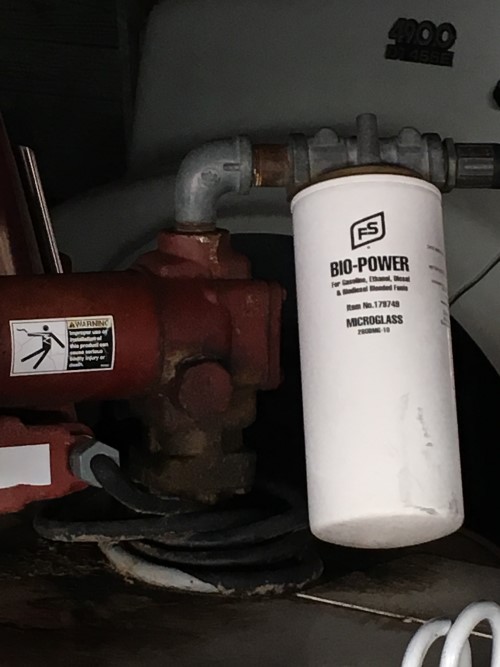A standard fuel dispensing system consists of numerous integral parts. Each of these parts has to operate at peak performance to achieve maximum efficiency. Knowledge of these integral parts and high-quality, dependable suppliers, provide a great foundation with which to build upon. FS Energy Specialists help you lay this foundation.
Proper tank and pump sizes, proper filtration, and fuel quality management directly affect the efficiency of your operation. FS Energy Specialists dedicate countless hours training with our industry-leading suppliers. This ensures we carry the knowledge and expertise to prove accurate recommendations best suiting your operations.
A winning operation starts with a winning strategy. Let's dive into some preventative measures you can take as part of your winning strategy.
Proper Tank and Pump Sizing
A system is only as efficient as its weakest or narrowest link. An improper tank or pump size can drastically reduce efficiency and increase costly downtime.
When is the last time you spoke to your fuel supplier about your tank or pump size? Have you upgraded your fuel equipment? Machine tanks are currently pushing 300+ gallons in size. This means a 15-20 GPM pump will cost you nearly twice as much time as a 30-35 GPM pump.
Man hours quickly rise when filling multiple machines at one time. Each hour is costly while filling machines in-season. The same is true for your fuel tank. When the capacity of your machine is 2-3 times that of your storage tank, you are putting yourself at risk for unnecessary down time.
Right sizing your tank provides you with in-season security. It also gives you the best opportunity to maintain the quality of that fuel over time.
Proper Filtration
Proper fuel filtration can be one of the most cost-effective preventative measures in a fuel dispensing system. The easy route with filtration is to purchase a low-cost, inefficient tank filter measured by the lack of "plugging". It does not measure the ability to filter fuel correctly. This is often a short term “fix” followed by cost repairs downstream.
 Proper storage tank filters can cost roughly 85% less than the cost of onboard machine filters. These storage tank filters filter fuel for numerous pieces of equipment. Ten and two micron FS Bio-Power Microglass filters provide the advanced level of filtration needed for todays HPCR (High-Pressure Common Rail) engines.
Proper storage tank filters can cost roughly 85% less than the cost of onboard machine filters. These storage tank filters filter fuel for numerous pieces of equipment. Ten and two micron FS Bio-Power Microglass filters provide the advanced level of filtration needed for todays HPCR (High-Pressure Common Rail) engines.
A filter that has reached its useful life and reduced fuel flow is not a failure. The filter has done its job. A simple switch at the storage tank level can significantly reduce the chance of costly downtime in the field.
Proper DEF Handling Equipment
At the introduction of DEF (Diesel Exhaust Fluid) and SCR (Selective Catalytic Reduction) systems in the early 2010’s, there was the belief off-spec DEF would immediately cause engine failure and machine shutdown. As the industry has grown, several users have tested this theory and proven the pass/fail belief as false. However, what these users have uncovered is a greater issue.
Instead of causing immediate engine failure, off-spec product actually degrades the catalysts in the SCR system. In turn, this increases the dose rates of DEF to achieve the NOx reduction required. What causes this degradation overtime is the use of unapproved materials for DEF storage and transfer.
Proper storage protects the integrity of the product. Store and transfer DEF through 304 or 316 stainless steel or high-density polyethylene to adhere to API standards. During transfer, a closed transfer system prevents atmospheric particles from contaminating the product.
These recommendations maximize your efficiency and keep your machines running at peak performance.
Fuel Quality Management
Fuel Quality Management (FQM) is a simple phrase with enormous implications. Not having an FQM plan can be detrimental to your operation.
The first step in remedying any problem is getting a diagnosis. Taking scheduled fuel samples provides you with this diagnosis. This provides you with information on the current state of your fuel dispensing system. From there, you can determine what actions you may need to take to remedy any issues.
Complete a full system check prior to any busy season. For the agriculture industry, this takes place before spring planting and fall harvest. Below is a list of items to review to ensure you are ready for the upcoming season.
- Profile a fuel sample, checking for signs of water separation or sediment.
- Inspect fuel storage tank for damage, rust, or leaks.
- Inspect storage tank venting system to ensure proper operation.
- Ensure proper function of fuel transfer pump.
- Install new fuel filter with proper micron sizes for machine fueling.
- Inspect dispense hose, checking for cracks, bulges, or leaks.
- Ensure proper function of fuel dispense nozzle.
The above checks double in importance for all temporary and transport storage tanks. The lack of product movement provides prime opportunities for fuel quality issues to arise.
Undisturbed fuel, which in most cases has gone through several heat cycles, provides the opportunity for condensation to build. This introduces water to the storage tank leading to rust, sediment, and a layer for microbial growth. While easy to overlook, proper fuel quality management is a winning strategy for your operation.
FS Energy Specialists
Your local FS Energy Specialist is your captain in understanding the right fuel equipment for your operation. We stay directly connected to industry leaders and take pride in being your source of information.
The easy route is always the path of least resistance. However, why do something easy two or three times when you can do it right once?
Taking the time to connect all integral parts creates a cohesive, highly efficient fuel dispensing system. This leads your operation down the path to another successful season.